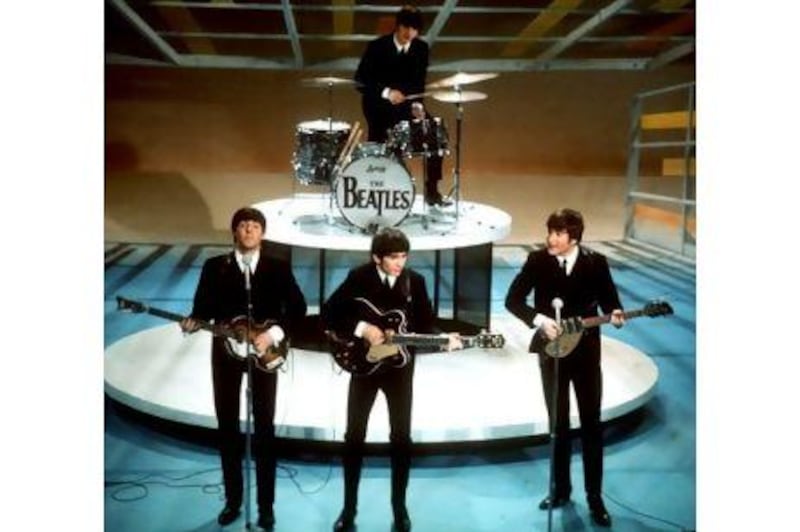"Every day create your history / Every path you take you're leaving your legacy" sang Michael Jackson on the chorus to 1995's HIStory. In a boon for entertainment lawyers everywhere, the paths Jackson took in his life were more tangled than most, and so is his legacy. He's not the first deceased artist who's unreleased creative output has been subject to intense bickering, but Jackson's is certainly one of the most high-profile.
When he died in June 2009, Jackon's estate was left in the hands of the Michael Jackson Family Trust, to be "administered by Sony ATV and various entities" - his mother Katherine Jackson takes care of the 80 per cent left to her and her grandchildren. Despite Jackson's lavish spending and numerous debts, in 2007 the value of the estate was put at $237 million (Dh871m). He may have passed away beset by financial problems - but it is now, after his death, that the dollars can start rolling: his first posthumous work, simply titled Michael, was released in December.
While the hype machine frothed, ultra-loyal Jackson fans were outspoken in their criticism of Sony for exploiting his legacy, some going so far as to boycott it - "Help Michael, not the parasites at Sony", demanded the Michael Jackson Justice blog in August 2010. Jackson's last studio album was 2001's Invincible, and during that long break he had reportedly been working on new songs with a variety of pop superstars from the class of 2010, including Akon and Lady Gaga. His recent collaborators were divided on the appropriateness of the release. The Black-Eyed Peas' Will.I.Am described the album as disrespectful: "Michael Jackson songs are finished when Michael says they're finished". Meanwhile Akon, who features on Hold My Hand, defended the album, saying it was "keeping Michael Jackson's legacy alive".
In addition to the controversy over which Jackson songs should be released, when, and by whom, questions have been asked about the authenticity of the new material. Four of the songs on Michael, those recorded in a 2007 session in New Jersey, were denounced as fake by his children Prince Michael and Paris, his sister Latoya and his mother Katherine, all of whom suggested that they had been sung by a Jackson impersonator. Sony emphatically denied this, assuring fans that all new tracks had been "scientifically tested".
The website Jackson's Secret Vault, which has backing from Katherine Jackson, responded with a sense of legacy one-upmanship, giving away "an actual authentic Michael Jackson track to the world for free" called Opis None - except that it wasn't an actual authentic, new Jackson track. Fans immediately spotted it as a rehashed version of the 1978 Jackson Five song, Destiny; the website quickly, and sheepishly, backed down.
Jackson has some way to go yet before he can match the rapper Tupac Shakur for posthumous output - Shakur's work-rate in death often outstrips most pop stars who are still living. Since his death in 1996 he has released no fewer than eight albums, two more than he managed during his five-year mortal career. Many of these records went double, triple or quadruple platinum in American sales, reaching a new audience largely through playing on the idea of an enduring legacy, using imagery fixated on time, life, death and memory.
Crucially, the way these releases are packaged do the same: his posthumous albums are called things like Until the End of Time, Tupac Resurrection, Pac's Life. One of Jackson's new songs, Breaking News, plays this game too, toying with our sense of reality. "Everybody wanting a piece of Michael Jackson" he sings - if it really is him: "Just when you thought he was done / He comes to give it again". After a certain point, as with Shakur, it almost seems irrelevant whether he's alive or not.
Battles will always rage over the artistic contours of musical legacies - over how a musician or band is remembered, and how their work is curated. What has changed in recent decades is how profitable the estates have become. The music industry has become increasingly skilled at selling the work of the deceased to us - or, increasingly, selling it back to us; having repackaged things we all bought the first time around.
The Beatles catalogue finally arriving on iTunes recently led to a massive upsurge in sales, thanks largely to the colossal public relations push by Apple; but it's hardly like the Fab Four's back catalogue had been difficult to get hold of previously.
Every year Forbes magazine compiles a Top-Earning Dead Celebrities list: in 2009 it was headed up by the late fashion designer Yves Saint Laurent, with $350 million (Dh1.2billion). Beneath him were Rodgers and Hammerstein with $235m, with Jackson third with earnings of $90m (he spent only the past six months of 2009 as a dead celebrity, of course) - beating the other musicians in the list, including Elvis Presley ($55m), John Lennon ($15m) and Jimi Hendrix ($8m). It gives a sense of the size of his persisting value that, in an era when music sales are plummeting, he can pull in $90m in six months' back catalogue sales and radio play. In 2010, with a full year to draw on, he came top of the list with earnings of $275m. He earned more than the 12 other names on the list put together, and more than 2010's two biggest living acts, U2 and AC/DC.
As the controversy rages on, the process of curating and repackaging Jacko's back catalogue looks likely to continue to raise hackles; it's a process that began long before Jackson died. In fact, a cursory look online reveals that already available to buy are Michael Jackson "best of" albums entitled Anthology, Number Ones, King of Pop, Gold, Greatest Hits, The Essential…, The Best Of…, The Collection, The Ultimate Collection, The Silver Collection and The Definitive Collection. Assuming they can think of any titles that haven't already been used, more are sure to follow.





